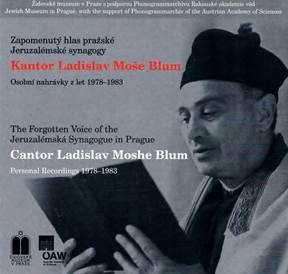
MOSHE BLUM : the Forgotten Voice of the Jeruzalémská Synagogue in Prague

Jewish Museum in Prague, 2008 , 2CD, 66 pp booklet in Czech and English. Price: 9,60 €
Click here to buy this release
The first time I ever heard the voice of Moshe Blum (1911-1994) was in 1985 when I found an LP of his singing in a second-hand store in Brussels. The fact that pulled me over to buy the Lp was that the biography mentioned he had sung opera and operetta. Blum had studied singing in Budapest but he was caught up by the war yet luckily survived several Nazi camps. Fast forward to 2015 and a visit to Prague and its Jewish museum. In the museum’s shop I saw the new and unique CD release and for the mere price of 9,60 Euro I bought it.
The Forgotten Voice of the Jeruzalémská Synagogue in Prague is an historical important double CD portrait released by the Jewish Museum in Prague with technical assistance from the Phonogramm archiv at the Austrian Academy of Sciences. The edition contains a selection of newly discovered recordings by Ladislav Moshe Blum at the Jeruzalémská Synagogue between 1978 and 1983, which have been preserved on 40 cassette tapes in the personal archive of his wife, Terezie (b. 1909).
Ladislav Moshe Blum was the last cantor of the pre-war generation, officiating as cantor in this synagogue during the years 1963–1994. He made these amateur recordings in order to preserve the local tradition for future generations.
The recordings were made in secret on a cassette recorder as it was inconceivable that he would have received official permission from the Communist authorities at the time. The recordings include famous cantorial compositions, as well as Shabbat and High Holiday services in the synagogue and memorial ceremonies for those who died in Terezín. As such, they document part of the religious and musical life of the Prague Jewish community under the totalitarian regime.
This double CD contains a selection of the most representative recordings made by this talented cantor with a "voix mixte" technique contrary to the Ashkenazic cantorate which always used "Kopfstimme". It also includes a 60-page booklet (in Czech and English) with information on Cantor Blum's life and on the story behind these recordings, as well as an ethno-musicological commentary and the lyrics of all the songs (also in Hebrew). The previously unknown recordings were discovered by the musicologist Veronika Seidlová. The latter prepared the recordings for release in collaboration with the Phonogramm archiv and provided the commentary for the booklet with the British musicologist Alexander Knapp and Cantor Michal Foršt.
Rudi van den Bulck, March 2016